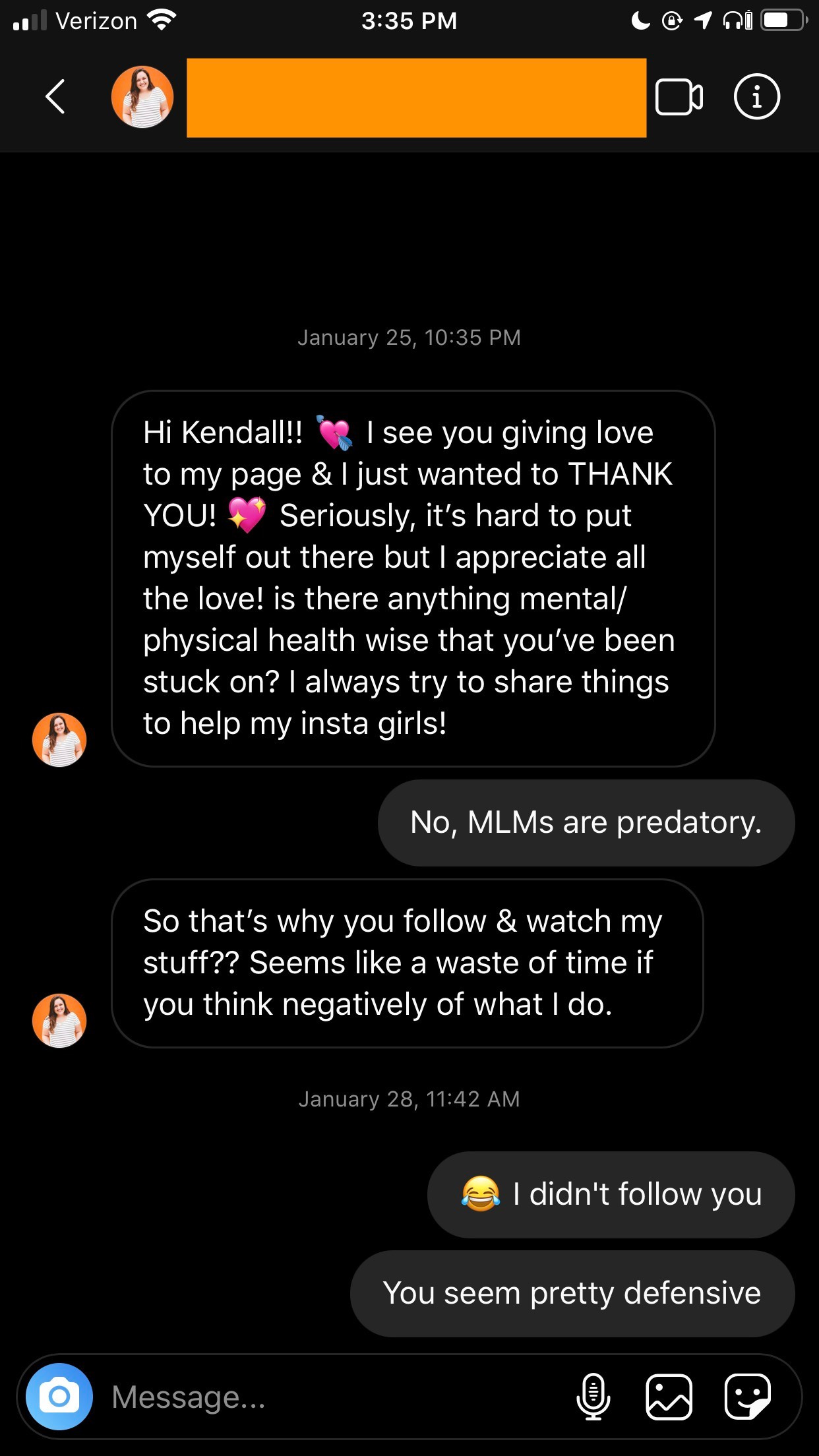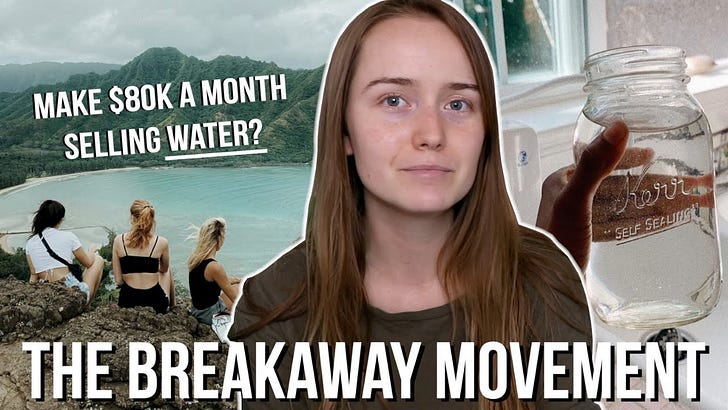"Hey (insert name)! Love your vibe, you're perfect for this business!"
Hi there,
Welcome to The Internet is Cool, a newsletter about the invariably strange, infuriating, uplifting, and cool information I find on the Internet.
Today we’re talking about multi-level marketing companies (MLMs), specifically those that use social media as a means to boast a lifestyle and income that is more than likely a façade.
To begin, a few disclaimers:
This piece is not “bipartisan,” if you will—chiefly because I believe it doesn’t deserve to be. MLM companies are so problematic for our physical bodies, mental health, financial wellbeing and communities that I cannot pretend that I am unbiased on this topic.
From where I sit, MLMs are most damaging to women—mostly younger, either millennial or Gen Z, and stay-at-home moms. This is not to say no other group is targeted by these companies; it’s from a combination of my experience being a woman and being targeted by other women shilling MLM companies, and because I haven’t yet researched enough about all the MLMs that do not specifically target women.
Finally—there is a tendency to refer to women in their 20s, even early 30s, as “girls”: this happens even in some of the sources I refer to here. And this definitely happens when people repping MLMs reach out to you—“Hey girl! Hey hun! I have this xyz opportunity…”
I refer to the women involved here as “women” because I dislike when people refer to grown women as “girls,” and because it’s not accurate.
Ready to get mad about MLMs with me?
Selling a lifestyle, not just a product
If you’ve ever gotten an unsolicited DM from someone on Facebook or Instagram telling you she “loves your vibe” or that you’d “be just perfect for this opportunity,” you were probably targeted by an independent consultant for a multi-level marketing company. Darlena Cunha’s article for The Atlantic, Beware of Selling Yoga Pants on Facebook, is a great primer on MLMs in the generation of social media.
Multi-level marketing companies are the legal version of a pyramid scheme. Pyramid schemes involve people making money by recruiting people to the company, who in turn recruit more people, who recruit more in perpetuity.
These scams eventually implode because they run out of people, and are illegal largely for that reason—because they “promise consumers or investors large profits based primarily on recruiting others to join their program, not based on profits from any real investment or real sale of goods to the public” (source). This is how multi-level marketing companies get around the illegality—they actually do have a product sold to the public.
Although MLMs have a real product (think Beachbody and their workout videos, or Enagic and their water machines, which we’ll talk about soon), the real money is still in recruiting to your “downline,” because it’s the gift that keeps on giving. Signing up someone for your downline isn’t just one sale of a product, it’s closing a deal where the “product” is a person who will presumably keep selling the product and signing up other people, making money for you.

That’s why all MLM leadership will focus on the “opportunity” heavily. And what’s more enticing to sell a business opportunity than selling the lifestyle behind it?
The business model of these companies wrapped up with the ubiquity of social media is a nasty cocktail because it’s easy to give off the illusion of wealth that you allegedly received from working with an MLM.
Anna from Anna’s Analysis did a phenomenal deep dive on a community called the Breakaway Movement, a training program (and massive “team” founded by Amelia Whelan) for Enagic, a Japanese company that sells alkaline water ionizer machines.
Enagic runs a program where independent consultants can sign up as “distributors” (under another distributor) and make commission off the water machines they sell. Machines retail between $2,000 and $6,000.
The video is two hours long and yes, I did watch it over a couple nights just like a movie. The impressive part is the breadth and depth of her research: she joined the training platform and studied the community for 6 months, so the video includes dozens of clips and quotes from actual distributors—some breathtaking in their flippancy for 1) the law or 2) other human beings.
I’d highly recommend a watch:
Here’s just some of what I found appalling:
Successful consultants host “mastermind” calls on the Breakaway platform, which is where independent distributors tune in to get advice, inspiration, and tips to run their businesses. In mastermind calls Anna watched, consultants emphasized a better-than-you attitude—how uninterested they were in engaging with people who were on the fence, or had probing questions about the opportunity. One said said she ignored people who asked about pyramid schemes.
The same consultant said she’d have people commit to a $10,000 sale of three products (called a trifecta in the Enagic world) in 5 minutes, because they aren’t skeptical. This was highlighted as a positive, something that happened because the consultant made it a point not to give off skeptical energy and instead cultivated a place of “abundance.”
In what world should I want a salesperson on my team who doesn’t ask questions, do due diligence, and compare alternatives?
But this is the kicker—in one training video, a woman encourages would-be consultants to open new credit cards as a way of paying for the up-to-$10,000 buy in to become a consultant. It’s important to note that credit limits are determined by income, so she says that you should “manifest” that $90,000 is coming your way this year and enter that as your annual income.
That’s called loan application fraud.
Setting consultants up for failure
Enagic consultants aren’t the only ones who focus on broadcasting a fake lifestyle (supported by their MLM scheme) to get as many new recruits as possible. In this video from Respectfully Sarcastic, the coach hosting the Beachbody Zoom call explains that she’ll share five tips to grow your business, but sets up a false dichotomy in the process.
Her first tip is committing to something called the “tracker.” We’re shown a screenshot of it, which is several columns of checkboxes signifying activities coaches are supposed to complete every day—Have I worked out and drank Shakeology today? Have I reached out to 5 new people about the opportunity? Have I responded to all my Instagram story views, likes and comments?
The coach ties up success and failure in completing the tracker, no room for gray area:
At the end of the year I can look back and see why or why not I’m where I want to be. At the end of the year, I can look back and say, you know what, we slayed this year. This year was awesome, and it’s because of all these check marks on these trackers—this is my book of proof.
And if we get to the end of the year, and it sucked, then I can look at the tracker, and I can be like, yeah, well, I only sent invites two days a week. I only posted every other day. No surprise there.
(Yes, the underlying assumption there is that you should be posting about your lifestyle from Beachbody and inviting people to the opportunity seven days a week or you’re not successful.)
What about the third option—I do everything in the Holy Beachbody Tracker, but my business isn't successful? Whose fault is it then?
Beachbody consultants, often stay-at-home-moms, are set up for failure by having such high expectations set for them, spending several hours a day on a “home-based business” you’re supposed to be able to do in your free time between playing with the kids and making dinner. When they can’t measure up, it’s easy to think their personalities are the reason for an inbox full of rejections, instead of the undesirable business pitch. This happens at the same time as their “uplines” make money off of them.
Later on, the coach tells a story about how she’s from a small town of “13 blocks,” so when she started coaching she didn’t want to be “annoying” on Facebook and reach out to too many people or too much.
She mentions that she had one friend who she thought would be perfect for the “opportunity,” but didn’t reach out because of the aforementioned worry about being annoying. But then, a few weeks later this friend posts an announcement that she’s started her Beachbody coaching journey. Our host is upset—“she should have signed up under me!” The lesson is clear: the more you worry about being annoying, the more sales and team-building opportunities you’ll lose.
While independent distributors and “coaches” might use the above as fodder to convince new coaches they just have imposter syndrome, I’d posit that constant worry about your job is a problem. Feeling like you’re annoying your friends and family by pestering them to sign up, or feeling like they’re letting you down by not buying hundreds of dollars of product from you is creating an unhealthy dynamic.
Being targeted as a potential recruit
I’ve been targeted by women recruiting me for MLM “opportunities” a handful of times, but the one below stuck with me the most.
The woman I got a message from had been reposted by someone else I follow, and I think she either lives in a van full-time or does a ton of hiking—either way, I was intrigued, so I went to her profile and watched a few slides of her story. What I realized after reading her bio was that she was definitely of the “quit my 9 to 5 to empower women to make ✨abundant income ✨” type (I believe she was with Plexus, a company that sells dietary supplements).
By watching three slides of her story, I was targeted as a prime candidate for her downline:

She equated MLMs with “what I do,” which is an astonishing admission from someone involved. Anna’s video above has some examples of the mental gymnastics distributors use to get away from the MLM label with its negative connotation.
Recently the terms “direct sales” and “network marketing” have become more popular as alternatives, but even the Federal Trade Commission recognizes that the terms can be used interchangeably.
I was blocked after my last message. Oops. (In retrospect, I might have been less rude. It’s hard not to be when I know this woman is sending me a sickly-sweet message while looking at me with $$$ in her eyes.)
What are your experiences with multi-level marketing companies? Have you been pitched before, and how did you respond? I’d love to hear it.


